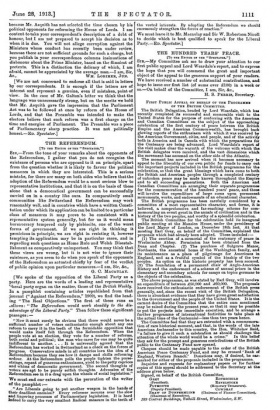THE REFERENDUM.
[To THE EDITOR OP THE "SPECTATOR."]
Sir,—From the tone of your remarks about the opponents of the Referendum, I gather that you do not recognize the existence of persons who are opposed to it on principle, apart from the question whether it is likely to favour the political measures in which they are interested. This is a serious mistake, for there are many on both sides who believe that the adoption of the Referendum would be a most serious blow to representative institutions, and that it is on the basis of these
alone that a democratical government can be successfully carried on in a country like ours. In comparatively small communities like Switzerland the Referendum may work reasonably well, and in countries which have a written Consti- tution under which its application can be limited to a particular class of measures it may prove to be consistent with a
representative system generally, but for us it would mean bureaucracy tempered only by plebiscite, one of the worst forms of government. If we are right in thinking it pernicious in principle, we are right in resisting it, however tempting its application may be in particular cases, and in regarding such questions as Home Rule and Welsh Disestab- lishment as comparatively unimportant. You may think that these views are wrong, but it is not wise to ignore their existence, as you seem to do when you speak of the opponents of the Referendum as actuated chiefly by fear of the verdict of public opinion upon particular measures.—I am, Sir, &c., G. C. MACAULAT.
[We spoke of the opposition of the Liberal Party as a party. Here are the words of a leading and representative `∎beral party organ on the matter, those of the British Weekly. In a pamphlet containing articles republished from that
journal (" Against the Referendum," 1909), we find the head- ing " The Real Objections." The first of these runs as
,ollows: "The Referendum. would work steadily to the dis- advantage of the Liberal Party." Then follow these significant passages:— "Now it must surely be obvious that there would never be a sufficient number of voters enthusiastic enough about any one reform to carry it in the teeth of the formidable opposition that would make itself felt through the Referendum. When the people vote at an election, they vote for a number of reforms, both social and political; the man who cares for one may be quite indifferent to another. . . . It is universally agreed that the Referendum has worked in Switzerland as a check on the forces of progress. Conservative minds in all countries love the idea of a Referendum because they see how it damps and chills reforming ardour. At the Referendum polls the people tighten the purse- strings, repent of generous enthusiasms, yield to the petty caprices and whims of democratic government. The second thoughts of voters are apt to be purely selfish thoughts. Advocates of the Referendum see in it a drag upon the wheels of social legislation."
We must end our extracts with the peroration of the writer of the pamphlet :—
" Are Liberals going to put another weapon in the hands of their deadliest enemies ? Every reformer mourns over the slow and lingering processes of Parliamentary legislation. It is hard indeed to carry the very smallest Radical measure in the teeth of the vested interests. By adopting the Referendum we should enormously strengthen the forces of reaction."
We must leave it to Mr. Macaulay and Sir W. Robertson Nicoll to decide which is best qualified to speak for the Liberal Party.—En. Spectator.]


























































 Previous page
Previous page